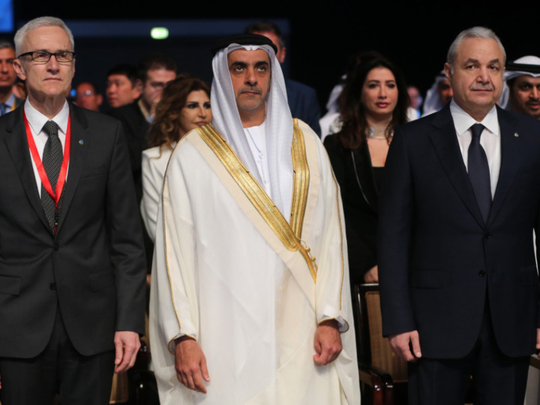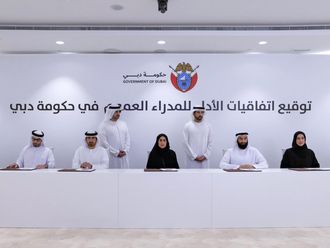
Abu Dhabi
The UAE empowers its people to fight crimes and contribute to building a safer and more secure world, said Lieutenant General Shaikh Saif Bin Zayed Al Nahyan, Deputy Prime Minister and Minister of Interior, yesterday.
Giving a keynote speech at the Unity for Security forum that began in Abu Dhabi yesterday, Shaikh Saif said, “The UAE believes that combating crimes begins and ends with human beings and has a deep-rooted commitment to building a safer and more secure world.”
The forum, held under the patronage of President His Highness Shaikh Khalifa Bin Zayed Al Nahyan, is an Interpol forum organised in partnership with the UAE government and the Interpol Foundation for a Safer World.
The forum, which concludes on Thursday brought together senior government officials and representatives from the private sector, to address common issues and identify responsibilities in combating future security threats focused around seven Interpol projects, namely counter-terrorism, cyber crime, cultural heritage, vulnerable communities, vehicle crime, drugs and illicit goods.
“The late Shaikh Zayed, the founding father of the UAE, understood the importance of cultivating human resources through comprehensive development and achieving quality of life, prosperity and well-being for the people, by establishing a modern and advanced infrastructure, promoting education and health, prospecting the future and encouraging an environment conducive to creativity and innovation,” Shaikh Saif said,
Shaikh Saif cited the moral education curriculum in schools launched by His Highness Shaikh Mohammad Bin Zayed Al Nahyan, Crown Prince of Abu Dhabi and Deputy Supreme Commander of the UAE Armed Forces, as a key element to develop and modernise education in the country.
He underlined the UAE’s commitment to the success of the forum and urged delegates to support Interpol in its efforts to combat crime.
Jurgen Stock, Interpol Secretary General, speaking at the forum, said, “The threats we face today are fast, mobile, self-reinforcing and interconnected, stretching and straining policing resources as never before. We are witnessing unprecedented complexity in our criminal and terrorist threat landscape which presents significant challenges to law enforcement,” Stock added.
“We need to better unite the efforts and streamline the processes between the public and private sectors and this Forum provides the ideal environment for reassessing our respective roles and defining the path for enhanced cooperation in the future,” said the Interpol head.
Elias Murr, President of the Interpol Foundation for a Safer World, said that security was an issue for all sectors.
“Terrorism has no religion, no country, no cause and no identity. The world, represented by every nation, state and religion, has no choice but to confront and eliminate terrorism,” Murr said.
“Today, the time has come to take action and move as part of a new global strategy. The time has come for the world to shift from being reactive to proactive,” Murr added.
Commenting on the sidelines of the forum, Robert Harward, Chief Executive Officer of Lockheed Martin, UAE, said this forum and its theme: Unity for Security, come at a very critical time for the region. “We are witnessing one of the most dynamic geopolitical threat landscapes that we have ever seen before. I am honoured to be a part of this forum and share my story, which I hope will benefit the individuals and nations gathered together with common purpose and determination to serve and protect what matters most.”
Box
How 10,000 child abuse victims were rescued
Jurgen Stock, Interpol Secretary General, shared a story of how concerted efforts of Interpol and its member countries helped to rescue 10,000 child abuse victims.
Stock said that in 2015, police agencies in two member countries — Australia and Denmark — started sharing material related to an unknown victim of online child sexual abuse with Interpol. Such data in the form of videos, images or sound files is stored and shared through Interpol’s International Child Sexual Exploitation database.
Some months later in 2016, using this database, analysis of school uniforms and language sounds in the videos started pointing towards a probable location of the abuse: in Japan.
The identification was accurate. Five men in Kyoto, Japan, had been approaching young boys in parks and on streets, and raping them. “They recorded their crimes and used applications to circulate the videos,” he added.
Stock said as a result of this one identification, the Japanese police was able to dismantle an entire network, and rescue 47 children from further abuse. The offenders have been brought to justice, and in February this year, the ringleader was sentenced to an eight-year jail term.
“In fact, more than 10,000 child sexual abuse victims have been identified to date through the cooperation encouraged by Interpol’s Child Sexual Exploitation programme.
“Achieving such results in tackling transnational crimes would not be possible by an individual entity acting on its own. Of course, this requires concerted efforts of law enforcement agencies in member countries, and steadfast support for their cooperation as reflected by the UAE’s voluntary contribution,” Stock said.












